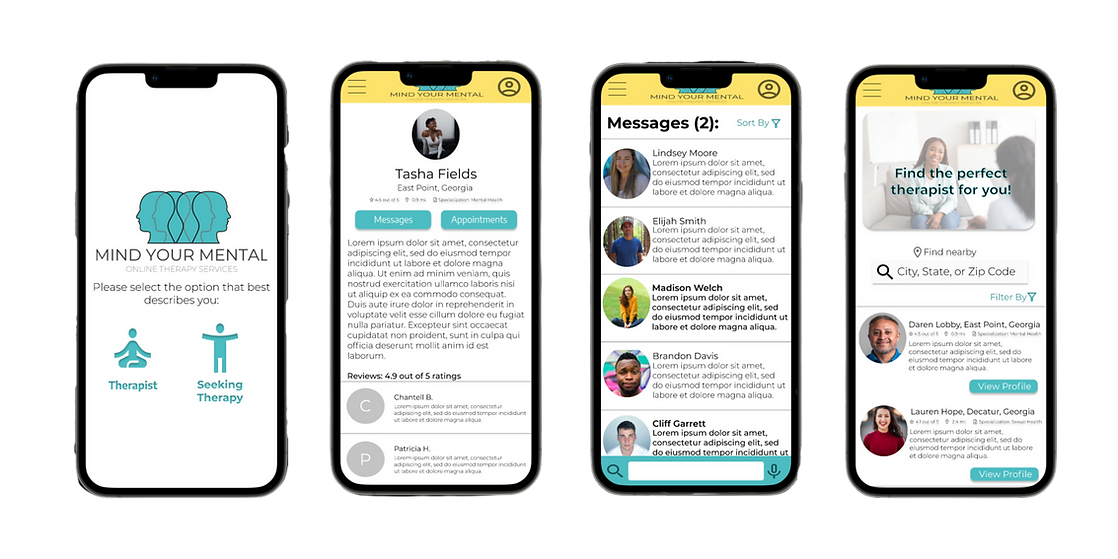Project Overview:
Mind Your Mental is a scheduling and management app for both therapists and those seeking therapy. This app strives to match therapy seekers with nearby therapists that meet their specific needs and desires, in addition to offering organizing and communication features for therapists to better stay connected with their clients. Mind Your Mental targets customers who value the convenience of close locations and operating messaging, scheduling, and managing in one app.
Challenges:
1) Eliminate barrier to entry on application sign up
2) Incorporate a way for users to view therapists based on their specific mental health needs
3) Create hosting tool that organizes bookings, messages, and appointments
.png)
User Research Summary
I conducted interviews and created empathy maps to understand the users and their needs. The two main targeted user groups are therapy seekers and those seeking therapy. Through research it was revealed thattherapy seekers wanted therapists specific to their needs and therapists who were overwhelmed with using multiple apps to keep track of their clients. These user groups confirmed initial assumptions, but research also revealed that these were not the only factor limiting for users. I created user journey maps and affinity maps to better understand the users’ thought process and their emotions throughout the process.
Research Questions
1. What group of users would benefit most from therapy services?
2. How are therapists currently staying organized with their workload?
3. What does the user need the most from a service like this?
.png)
%20(1).png)
Meet the Users
Based on our users, I was able to decide which pages to focus on during the usability study.
1. Location Sharing: One of the main frustrations from the users was lack of location convenience with therapists. Focusing on this screen and asking questions about that specific process helped me understand if the functions were easy for the user to navigate through.
2. Booking/Appointments: The main point of this service is to be able to book a therapist or check bookings from clients. Focusing on this screen during the study gave me insight of how to make the booking process easier for the user.
3. Therapist List: Users can't complete the cycle of the app if they can't figure out how to find the right therapist for them or how to scroll and look for the right match. Focusing on this screen helped eliminate barriers the users faced while trying to find a therapist.
4. Messaging: One of the goals for this project was to include a messaging tool for both clients and therapists. I focused on this screen to make sure it was easy for the user to navigate through.



Solutions to Challenges

Challenge 1:
Eliminate barrier to entry on application sign up
Giving the users the option on using location services eliminate any barriers that would restrict them from using the app. Even if the user decides not to use the location services, they are still allowed to find therapists based on their specific needs.
Challenge 2:
Incorporate a way for users to view therapists based on their specific mental health needs
By adding the "filter by" button, users are able to view therapists that are specific to their needs and preferences.


Challenge 3:
Create hosting tool that organizes bookings, messages, and appointments
Each design displays detailed information for all users.
Accessibility Considerations




Takeaways
What I learned:
I learned how beneficial usability studies are and how they actually give me more ideas to ideate as I go through the design and implementing process.
Impact:
The app makes users feel like Mind Your Mental really thinks about how to make managing clients easier and giving the users options that tailored specifically to their needs and preferences as opposed to committing to a "one size fits all" stand point.
User Feedback:
“The app made it so easy to find a therapist close to me that has experience dealing with things I struggle with in my everyday life.”
CONTACTME
For additional findings and learnings, please contact simsmadison3@gmail.com.



